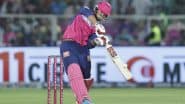Vatican City, Apr 28 (AP) As the Vatican switches gears from saying goodbye to Pope Francis to electing his successor, the status of a once-powerful Italian cardinal has been a constant question and source of gossip as preparations get under way for the May 7 conclave.
Cardinal Angelo Becciu was once an influential Vatican chief of staff who was a leading papal contender himself. But he fell from grace in 2020 when Francis forced him to resign his job as head of the Vatican's saint-making office and his rights as a cardinal because of allegations of financial misconduct.
Becciu denied wrongdoing but was put on trial in the Vatican criminal court and convicted of finance-related charges in December 2023. He is appealing the conviction and 5 1/2-year prison sentence and has participated in the pre-conclave meetings, but there is a lingering question about whether he can actually vote in the conclave.
On Monday, cardinals entering the pre-conclave discussions were inundated with questions by journalists about whether Becciu would be allowed in the Sistine Chapel or not. No decision was taken.
Becciu rose to prominence and power under conservative Pope Benedict XVI and is very much affiliated with the conservative Vatican old guard. While he initially became a close adviser to Pope Francis, Becciu's subsequent downfall at the hands of Francis might suggest he would vote for someone keen to undo some of Francis' reforms.
At 76, Becciu is under the age limit of 80 and technically eligible to vote, but the Vatican's official statistics list him as a “non-elector.”
When he was ousted in 2020, Becciu told a hastily arranged news conference that he would not be voting in any future conclave. But recently he has insisted he is entitled to vote and canon lawyers have been poring over the Vatican document regulating the conclave to determine if he's right.
The document, known by its Latin name Universi Dominici Gregis, lays out the criteria for electors, making clear that all under-80 cardinals have the right to elect the pope, except those who have been “canonically deposed or who with the consent of the Roman Pontiff have renounced the cardinalate.” It adds that after a pope has died, “the College of Cardinals cannot readmit or rehabilitate them.”
There has never been any clarity on what exactly Becciu renounced or how: The one-line statement issued by the Vatican press office on September 24, 2020 said merely that Francis had accepted Becciu's resignation as prefect of the Congregation for the Causes of Saints “and his rights connected to the cardinalate.” There is no indication he has been sanctioned canonically.
After he forced Becciu's resignation, Francis visited Becciu on occasion and allowed him to participate in the life of the Vatican. But Francis also changed Vatican law to allow the city state's criminal tribunal to prosecute him.
Italian daily Domani reported last week that during the initial pre-conclave discussions, Becciu was presented with two letters signed by Francis before he died indicating he should not participate in the conclave. But it wasn't clear what weight those letters have or whether the College of Cardinals can override Francis' wishes.
The issue is not minor, since Becciu's participation or lack thereof could invalidate the election.
Asked again Monday if Becciu would participate in the conclave, Vatican spokesman Matteo Bruni demurred. He said the issue was discussed but that there was “no resolution.”
Questions, meanwhile, have continued to swirl about the integrity of the trial that convicted Becciu and eight others. During the proceedings, the court heard that Francis intervened on several occasions on behalf of the prosecutors and that the prosecution's prime witness against Becciu was coached and manipulated by outsiders.
The appeal is scheduled to begin in September. (AP)
(This is an unedited and auto-generated story from Syndicated News feed, LatestLY Staff may not have modified or edited the content body)













 Quickly
Quickly













